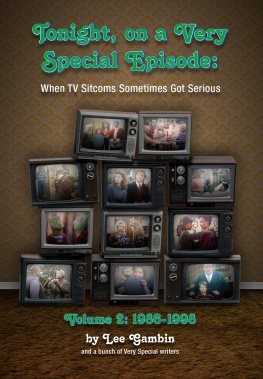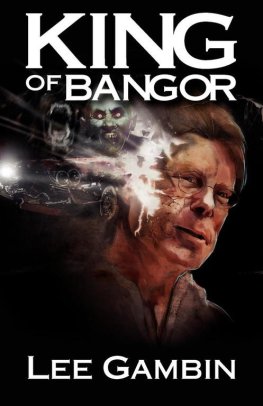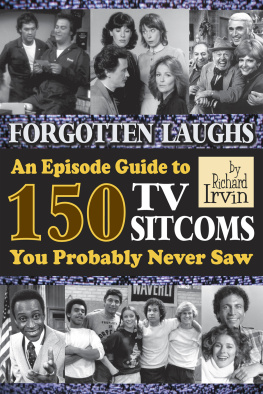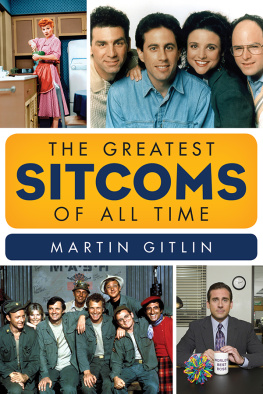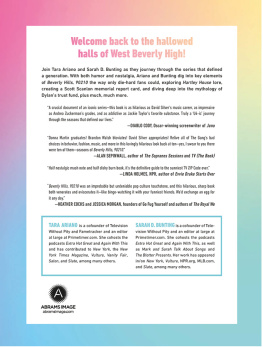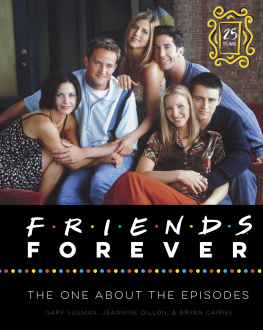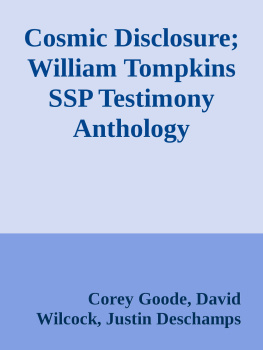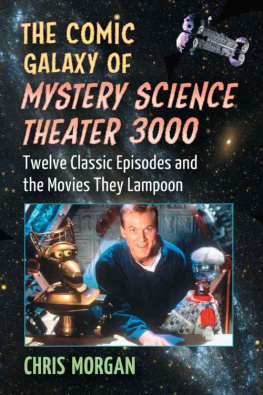Contents

Tonight, On A Very Special Episode
WHEN TV SITCOMS SOMETIMES GOT SERIOUS
Volume 2
By Lee Gambin
AND A BUNCH OF VERY SPECIAL WRITERS

TONIGHT, ON A VERY SPECIAL EPISODE
WHEN TV SITCOMS SOMETIMES GOT SERIOUS
Volume 2
By Lee Gambin
All rights reserved.
No portion of this publication may be reproduced, stored, and/or copied electronically (except for academic use as a source), nor transmitted in any form or by any means without the prior written permission of the publisher and/or author.
Published in the United States of America by:

BearManor Media
4700 Millenia Blvd.
Suite 175 PMB 90497
Orlando, FL 32839
bearmanormedia.com
Printed in the United States.
Paperback ISBN 978-1-62933-641-1
Hardback ISBN 978-1-62933-642-8
Cover design by Darren Cotzabuyucas, @dc80
Text layout by Robbie Adkins, www.adkinsconsult.com
Dedicated to anyone who found solace in the warm glow
of
the television sitcom
may this take you back to those treasured moments
shared with the likes of the Owens and their beloved Mr.
Belvedere, Mork and Mindy, the news team at WJM, Dorothy,
Rose, Blanche and
Sophia, the kids of Bayside and beyond
Table of Contents
By Lee Gambin
1986 1989
1990 1993
1994 1998
Very Special Honorable Mentions
Volume Two:
1986 1998
(With additional Very Special honorary mentions)
An Overview of the Very Special Episode
By Lee Gambin
What is a Very Special Episode?
In my research and in working on this book which has been as rewarding and comforting as the classic American sitcoms that I grew up watching and continue to revisit and wholeheartedly embrace I have come to the conclusion that there are in fact four variants of what constitutes a Very Special Episode (VSE) in a television situation comedy.
Number one is the most popular and the class of VSE that is most thoroughly examined: that is, an episode that addresses a social issue that counters the standard comedic lightheartedness of the series. These episodes are a one off example of exploring serious subject matter. These issues could involve drug addiction, rape, abortion, molestation, domestic violence, prostitution, homelessness, racism, coming out, disability and so forth.
The second example is an episode where a regular characters life is jeopardized or cut short i.e. they are in an accident, diagnosed with a terminal illness or killed off. So these are not necessarily taking on social issues, but instead putting characters we have come to love in peril.
The third, and possibly the most ambiguous one, is where an event or happening occurs that would be classified as a social issue or social concern, but its something that carries with it a history of dramatic influence throughout the entire series. In other words, topics and socially conscious subject matter will pop up throughout the sitcoms run. A perfect example of this are the varied episodes from say The Mary Tyler Moore Show (19701977) a sitcom which continually addressed themes of sexism, women in the workplace, the plight of the decidedly single woman, contraception and more. These are commonly found in the advent of the dramedy fad which would rise to prominence in the late eighties and into the nineties with sitcoms such as Roseanne (19882018) being a clear example.
And the final example of a VSE are episodes that are landmarks i.e. final episodes that leave a major impression, weddings, when characters leave or when characters who will become massive pop-culture icons are first introduced and so forth. Goodbye, Farewell and Amen from M*A*S*H (19721983) would actually be a feature TV film rather than a regular episode, making it an extra special VSE in a sense, and would boast one of the highest ratings in television history.
To get to where the Very Special Episode firmly established itself as a pop-cultural phenomenon, you have to look at the history of TV comedy. The fifties was the true starting point for what we now know as the traditional American situation comedy and during this period, most of the shows were built around a stars appeal be they from movies or theatre such as The Donna Reed Show (19581966), The Phil Silvers Show (19551959), The Danny Thomas Show (19531965), The Bob Cummings Show (19551959) and so forth. However, concept television was becoming incredibly popular and steady plot-driven situational comedy was winning the hearts of audiences spearheaded by shows such as I Love Lucy (19511957), Leave it to Beaver (19571963), Father Knows Best (19541960) and others. These provided halcyon ideals about America and domesticity. When the sixties hit, TV sitcoms were massively popular and were varied in theme and content, however, there was a definite running theme as to how they were conceived and constructed and their tone was almost in perfect synch with one another something I like to call the comfort zone period of television, where everything was warm, inviting and fun.
Sixties sitcoms were very genre specific; for example The Munsters (19641966) used the classic Universal monsters as a launch pad, and some shows would be based on high concept ideas or loosely based on films that came before them, such as Mister Ed (19581966) which would be inspired by Universals popular 1950s Francis the Talking Mule movies and a lot were fantastical and way out, such as My Mother the Car (19651966). These sitcoms were bright and completely developed to be escapist fare absolutely fun and sweet, but not really reflecting the times they aired.
So along comes the seventies and TV grows up. A landmark moment in television will come in the form of All in the Family (19711979) which would ultimately be the starting point in this trend of TV that went hard and hit home and delved into serious subject matters within a comedic format. All in the Family also came into popularity during a period in television called the rural purge, where shows with country settings were gradually disappearing off air and urban shows began to surface. Green Acres (19651971) and Petticoat Junction (19631970) would disappear, as audiences were welcomed to the gritty world of real life cities like New York.
The forerunner in this kind of television, would be writer/producer/show runner Norman Lear who would introduce direct and overt social commentary to his situation comedies, changing television forever. These TV shows and the descendants of the Norman Lear universe would be extensions of two major artistic influences from primarily the fifties the social message film and the dawn of the PSA (the public service announcement).
I feel that the Very Special Episode is practically an off-shoot of these two distinctly American institutions one being message movies that were tapping into social taboos during the final years of the Motion Picture Production Code (films that defied the censors and discussed sex, teen angst, drug warfare, race issues, adultery, abortion) and the PSA which came in varied forms such as white coat films or propaganda shorts which taught you about varied things such as STDs or how to spot communists among other essentials.

